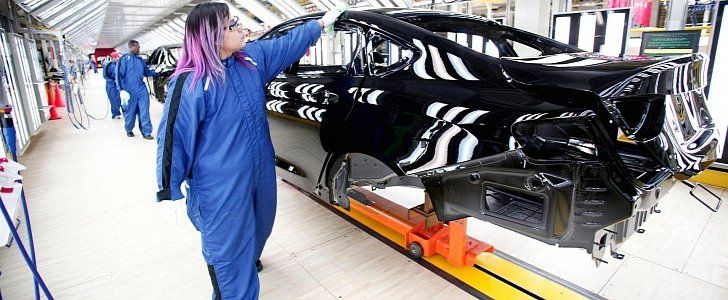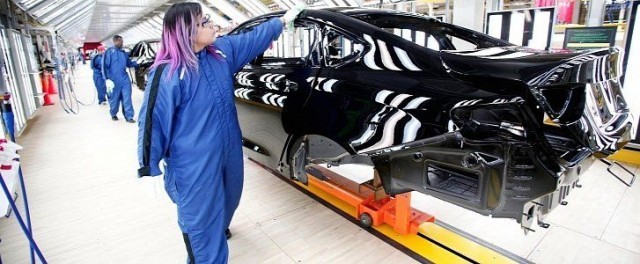



The other 1,900 workers in the plant will be employed sporadically. Workers who build FCA’s Chrysler 200 car have spent most of 2016 on “temporary” layoffs with a return-to-work date. However, the call-back dates are postponed or workers return for a week or two and then are laid off again.
The layoffs will also affect Sterling Stamping plant, the assembly plant’s main supplier of doors, roofs, hoods and other stampings.
This is the auto industry’s first mass indefinite layoff since the 2009 General Motors and Chrysler bankruptcies. Chrysler streamlined its operations then by closing six plants and several warehouses. The company exploited workers’ fears of an uncertain future, scaring thousands of them into quitting or taking buyouts and retiring. When sales rebounded, Chrysler replaced these high-seniority workers with new hires who received substantially lower pay and benefits under the two-tier pay structure.
The two-tier payment system was introduced in the United Auto Workers 2007-11 contracts with the Detroit Three automakers and was then expanded as a condition of the bailout during the bankruptcy. Subsequent contracts have raised lower-tier workers’ wages, with the latest contract allowing many of them to eventually make top pay. Yet with an eight-year wait to get the maximum wage, pay gaps still exist.
Based on seniority, lower-tier workers are the first ones laid off and the last to be recalled. Michigan workers can only collect 20 weeks of state unemployment benefits.
In the 1950s the UAW negotiated Supplemental Unemployment Benefits. When combined with state unemployment checks, SUB allows workers to take home more than 70 percent of their weekly pay and makes up the difference when unemployment benefits stop.
However, second-tier workers with one or more years of service can only collect 13 to 26 weeks of SUB, while “temporary” workers and those employed for under a year do not get any SUB. “Traditional” workers with less than 10 years of service are also limited to 26 weeks.
Time to raise hell
The UAW should be raising hell about these layoffs and their resulting hardships. Instead, Norwood Jewell, UAW vice president assigned to FCA, stated, “While today’s announcement of a shift reduction at Sterling Heights Assembly is unfortunate, it is not unexpected. FCA is not the only company experiencing a slow market for small cars.” (uaw.org/issues/, April 6)
This is pure hogwash. The 2015 Chrysler 200 is not a small car but a midsize sedan. Sales in this segment industry-wide are only down 2.2 percent from a year ago. Auto journalists call the vehicle lackluster, but the 200 was hyped two years ago by Chrysler officials when it debuted at the Detroit auto show.
FCA CEO Sergio Marchionne has allowed its “flagship” 200 cars’ sales to plummet as part of its plan to eliminate car production in UAW plants, only building in the U.S. large trucks and sport utility vehicles with the highest profit margin.
Marchionne claims that a “permanent change” has occurred in automotive buying patterns, but facts do not support his stance, as many variables influence this market. The CEO is gambling with workers’ livelihoods
Echoing the company line, Jewell stated, “On a bright note, there is a strong demand for larger-sized vehicles. The company has been planning to increase its capacity to build more trucks and SUVs. … [T]his move will be a positive one for our members and the company.”
This corporate strategy will not help workers when they run out of SUB and unemployment benefits, especially those who are the lower paid. Many of them are African-American youth from Detroit, whose jobless rate is astronomical.
FCA plans to increase the Sterling Heights plant’s workforce when it begins building the Ram pickup, but that is 18 months from now. Now the Ram is built at Detroit’s Warren Truck Assembly Plant. The retooling will cost the Detroit area 750 jobs, says FCA.
This over-reliance on the large-vehicle market is the very strategy that, compounded by a crisis of capitalist overproduction, nearly ruined Chrysler in the last auto recession. Inflated gasoline prices and a construction slump reduced sales in this segment.
Moreover, large vehicles have the highest carbon footprint. Marchionne’s strategy, which the UAW leadership shamelessly endorses, displays a reckless disregard for the planet.
Fiat — now merged with Chrysler — was the beneficiary of the 2010 state-orchestrated bankruptcy, gaining a 35 percent stake in the company at no cost and then gaining full ownership on the cheap. Threatened with Chrysler’s liquidation, the UAW made major concessions. Contract language limiting layoffs to 48 weeks over the life of the four-year contract and SUB for the entire layoff period were eliminated. Now the most exploited workers will pay the price.
Capitalists put profits before people
“Slow sales” are presented as the root cause of layoffs, as if market cycles are as natural as weather cycles — and workers must live with the consequences.
The corporate media claim that union wages and benefits are killing autoworkers’ jobs. That is the gist of the April 10 Detroit Free Press editorial on Ford’s announcement that it would invest $1.6 billion in a new plant in Mexico employing 2,800 workers. Ford is moving production of its small car, the Focus, from Michigan to San Luis Potosi. The newspaper blamed the UAW’s “ballooning contract demands” and moaned, “Without the tiered wage structure, Ford doesn’t have much of a choice where it manufactures small cars.”
The contracts ratified last year were not expected to significantly increase labor costs. “This agreement provides a good foundation for Ford Motor Company, our employees and our communities,” said John Fleming, Ford’s vice president of global manufacturing and labor affairs. (New York Times, Nov. 20)
Punishing the workers for winning a bigger share of the wealth they produce is rampant. Nabisco/Mondalez has announced plans to shift production of Oreo cookies to Mexico from its unionized Chicago factory.
The real threat to workers’ jobs, beyond corporations’ heartless decisions, is the capitalist mode of production that puts profits before people. This system can’t be “fixed” to prevent layoffs and plant closings. What can workers do?
Property right to a job
During the 1935-37 wave of sit-down strikes — which lasted from less than an hour to more than two months — a widespread belief arose that workers have a property right to their jobs. Even President Franklin D. Roosevelt’s Secretary of Labor Frances Perkins and Michigan Gov. Frank Murphy echoed that worker sentiment.
In 1987, as GM closed a record number of plants, the Job Is a Right Campaign asserted that a job is a property right and demanded a moratorium on plant closings. This mass movement helped to strengthen job security language in UAW contracts.
Discussing the right to a job leads to this conclusion: If workers have a property right to their jobs, they have a right to prevent their property from being taken away. This was the key legal defense of the sit-downs, when GM management howled that seizing the plants violated the sacred right of their ownership. Autoworkers, however, have sweat equity in the plants and have the right to occupy them in their own interest.
FCA’s layoffs and the auto industry’s flagrant disregard of global warming prove that capitalists cannot be entrusted with our future. Workers must seize the means of production — not only to defend their jobs — but to ensure the planet’s survival.
Grevatt is a 28-year Chrysler worker and UAW member.
The epic struggle of the Palestinian people against the full weight of U.S. imperialism and…
The following report comes from the Bronx Anti-War Coalition organizers on a protest held in…
In the Canadian federal elections held on April 28, the Liberals won with 169 seats…
The following is Part 2 of a talk given by the author to a meeting…
Boston Students, professors and workers are confronting the Trump administration’s fascist crackdown at universities across…
Philadelphia Within days of Swarthmore students reviving a pro-Palestinian encampment on April 30, police arrested…